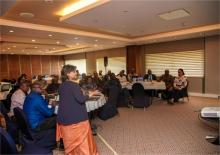WHO Nigeria puts together a comprehensive Business Continuity Plan to scale up readiness of the office
Abuja, 29 November, 2019 - The World Health Organization (WHO), Nigeria has concluded a workshop to develop its Business Continuity Plan (BCP) using the new country guidance documents and template.
The 4-day workshop (26- 29 November 2019), attended by over 40 participants, drawn from the WHO Nigeria Federal, Zonal and State offices was supported by the WHO Regional Office for Africa and the Headquarters reviewed the critical aspects of WHO operations in line with the WHO Africa Regional Office (WHO-AFRO) Transformation agenda – a vision and a strategy for change, aimed at facilitating the emergence of a WHO that staff and stakeholders want and are able to deliver in the event of any challenging situation including emergencies and disasters.
The BCP is essential to ensure WHO continues to perform it critical operations, processes and functions in the event of a disruption which may render the organization unable, unavailable or incapable of assuming and performing their responsibilities and delegations of authority. It is also essential in maintaining communications with WHO HQ, Regional and Country Offices, UN agencies, funds and programs, other development partners, and appropriate local and national authorities. It will protect and ideally ensure access to WHO essential facilities, equipment, vital records and assets and eliminate or mitigate the impact of disruptions on WHO operations.
“All WHO duty stations must be able to continue critical processes during and after a disaster or crisis”, said Dr Ifeanyi Okudo, Health Emergencies cluster lead, WHO Nigeria.
“The likelihood of events such as major power outages, natural disasters, terrorist attacks and a possible epidemic or pandemic specifically highlight an urgent need for WHO to implement a corporate Business Continuity Management strategy, to strengthen the organization’s ability to provide for staff safety and security as well as to ensure that critical WHO functions are continuing during and after an incident in order for WHO to deliver its mandate. The central element of this strategy is the BCP” – he added during his welcome speech at the inauguration of the workshop.
In her remarks, Ishata Conteh, WHO AFRO Readiness Technical Officer stated “having the BCP will provide organizational and operational stability in case of emergency, by having the capacity to continue and control critical processes, operational services and functions until normal activities are reconstituted.”
“By the end of 2019 the regional office will be supporting Mozambique and Sierra Leone in drafting their BCP. The regional office aims at rolling the BCP guidance to the remaining 44 countries by the end of the second quarter of 2020.” She added.
The WHO HQ Readiness team lead Dr Qudsia Huda highlighted that the Nigeria WCO is the first country in AFRO to use the recently published WHO global guidance to develop the BCP. She mentioned in her opening remark. ‘In a Region like AFRO where emergencies are everyday challenges, the BCPs will help the country offices to operate in a more effective way optimizing the use of existing resources’.
The WHO Nigeria BCP drafted was based on a thorough analysis, including the recently conducted risk assessment, the identification and ranking of critical programs and the operational support required. It furthermore outlines a concept of operations to be applied during emergencies, which defines decision-making processes, alert, notification and communication procedures, as well as responsibilities of units and individuals during disruptions of normal functions of the country office.
The workshop concluded with a draft BCP developed and a number of concrete recommendations/next step to finalize the BCP in the coming weeks.




